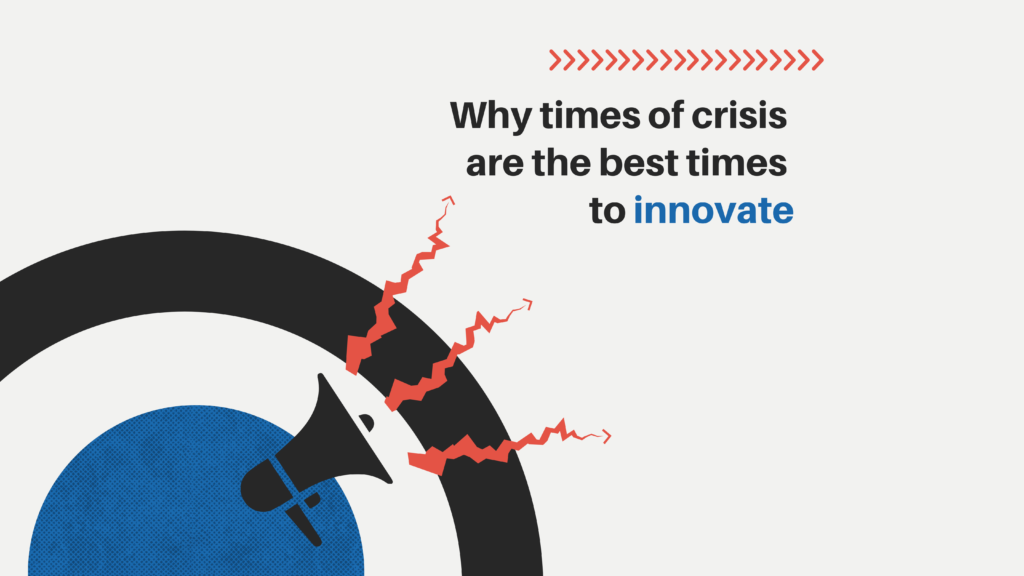While survival may be the first thing that comes to mind when a crisis hits your business, innovating simultaneously will help your business thrive in the post-crisis market.
Some experts even say that the best time to innovate is during a crisis. They argue that innovating during a crisis produces the most beneficial results for a corporation, especially during the crucial post-crisis years.
The benefits of investing in innovation during times of crisis
Experts agree that the best time to innovate is during times of crisis. And they have the data to back it up.
A McKinsey & Co. study found that businesses that innovated throughout the 2009 financial crisis outperformed their competitors by up to 30% post-crisis.
But why is that?
Crises create an environment that is conducive to innovation because they rapidly change how the world works. This is why companies that invest in innovation could be some of the first to adapt to the post-crisis world, and even shape it.
Larry Clark, Managing Director of Harvard Business Publishing Corporate Learning, shared 4 reasons why crises make a great time to innovate.
1. Uniting around a common purpose
According to Clark, crises generate a spike in energy in teams because of the additional challenges it brings to the table. A great leader is one that can channel this energy into productive efforts that will help the company survive and thrive during and after the crisis.
One common purpose teams unite around during crises is survival. Businesses could have a “sink or swim” mentality – especially if a crisis drives customers away and therefore dries up revenue
Teams could generate new ideas and innovations that will help them weather the crises. And these new ideas are often unthinkable in “normal” times.
2. Opening up to fresh perspectives
Another way a crisis brings about innovation is by exposing a business’ vulnerabilities and problems. Because many vulnerabilities go unseen in “normal” times, businesses are often caught off-guard.
Thus, crises are an opportunity to make your business run more effectively and efficiently by improving systems, structures, and the way you do business.
You can also use it as a chance to find opportunities to improve your current offerings or develop and launch new offerings as you spot vulnerabilities in your competition.
3. Upending long-standing traditions
A crisis may also upend long-standing business traditions. The way you do business could easily become incompatible with market needs and wants during a crisis and even post-crisis as the world adapts to the “new normal.”
One example that the Covid-19 pandemic brought about was the general impossibility of in-person work due to health and safety risks.
Companies had to quickly adapt to flexible modes of work, which many still continue to do today as it is more capital-efficient than renting an office and time-efficient for workers who don’t have to commute to the office anymore.
4. Innovate to survive, and even thrive
Crises push businesses to adapt to the rapid market changes and challenges they bring about.
Thus, companies are pushed to experiment and innovate to find out what will work and what won’t in an effort to survive and thrive in a crisis.
This goes hand in hand with all the other reasons why crises generate innovation.
More executives now realize the importance of constantly innovating, especially during times of crisis
The 2016 Corporate Longevity Report of Innosight found that 66% of the 91 surveyed CEOs agree they need to introduce new products or services and revamp their business model due to rapid changes in the market and disruption. But only 15% said they were very confident they could do so within a 5-10 year timeframe.
Just a few years after Innosight’s report, the pandemic exacerbated the need for companies to be flexible and innovative. Now, even more executives realize the importance of constantly innovating.
A 2020 McKinsey & Co. study on the impact of Covid-19 on businesses found that out of 200 surveyed companies, 90% stated that the pandemic will change the way they do business over the next 5 years.
Yet, only 21% said they have the expertise, resources, and commitment they need to adapt their businesses to the post-crisis normal.
The disparity between the need for companies to innovate and their preparedness to innovate is a crisis in itself – one that businesses need to actively solve before the next major crisis strikes the market.
Preventing a “sink or swim” situation in your company during the next crisis
Historically, innovating during times of crisis produces the most significant results on average. But even then, it is also important for your business to constantly innovate.
The worst situation your company could be in is one where you’re on the cusp of total failure, which could happen anytime. One wrong decision could spell disaster for your company.
To be prepared to innovate and survive the next crisis, your company needs to start building its capability to innovate as soon as possible. This is where innovation learning and certifications, like those of the Embiggen Innovation Institute, come in.
These can equip your team with the skills you need to innovate successfully. Services like innovation bootcamps give your team a crash course in innovation before they really dive deep into the topic.
You can also give your team more in-depth learning opportunities through certification programs.
For example, the Global Innovation Management Institute (GIMI) offers globally-recognized innovation certifications. They teach their students tried-and-tested innovation tools, theories, and frameworks through an action-learning method. It has certified over 10,000 innovators including those from Fortune 500 companies.
Another example is the Post Graduate Diploma in Corporate Innovation & Digital Leadership, which was made by EII and the prestigious Asian Institute of Management (AIM). It is the first corporate innovation and digital leadership executive education program in the Philippines and covers topics ranging from digital transformation to corporate foresight.
Learn more about getting your team innovation certified here.

